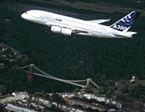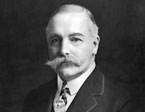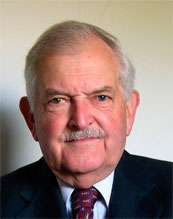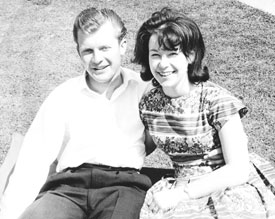|
|
Oral Histories
Over the last few years Filton Community History has been conducting an extensive oral history project, recording interviews with over 70 former employees of the West of England aviation industry, some starting out as BAC apprentices way back in the 1930s and 1940s, many following in the footsteps of their fathers, grandfathers and other family members.
The edited transcriptions of these interviews will be published later this year. On this page you can listen to some extracts from the original audio recordings. Further extracts will be added during the course of 2010 and some will be played at the BAC 100 exhibition at Bristol's City Museum and Art Gallery in the autumn.
Our thanks to Peggy Allen, Jackie Sims, Jane Tozer, and the other volunteers who have worked on the project for making this invaluable material available to BAC 100. Thanks, too, to Jo Williams who was appointed to coordinate the most recent collection of interviews and who kindly edited some of the audio extracts used on this website. No material from these oral histories, or any other content on this website, may be reproduced without the permission of the copyright holders. All of the recordings are in MP3 Format Sound.
Roy Mockridge (recorded 8 August 2002)
Roy started his Bristol Aeroplane Company apprenticeship as a tool maker in 1939. His father had joined the company two years before. Roy was 16 years old when he was caught in one of the shelters that were hit in the major day-time bombing raid of 25 September 1940. He moved to the USA 1948 where his BAC apprenticeship meant he had no trouble in finding a good job.
Roy Mockridge - Extract 1 03:43 minutes (3.50MB) (MP3)
Roy recalls the hit on the tool room shelter where he was sat during the bombing raid and where most of his friends were killed.
Roy Mockridge - Extract 2 02:43 minutes (2.59MB) (MP3)
Roy recalls his recuperation, serving in the Home Guard and a failed attempt to escape the blitz by going to Portishead.
Roy Mockridge - Audio transcription and notes (Word file)
The pupils of Hillfields have written poems inspired by Roy's oral history. Read them on the Hillfields page in the Children's Showcase. |
Dave Harris (recorded 13 March 2009)
Dave joined BAC as an office junior before starting his apprenticeship in December 1957. He became a fitter and was also a volunteer Welfare Rep. His father had worked in the engine division as a stores manager and his brother was a tool maker. Dave met his wife Bernice when she was working as a secretary at the company. The photograph shows Dave and Bernice at the launch of the BAC 100 books in July 2010. You can see a photograph of the couple in the 1960s with Bernice's interview at the bottom of this page.
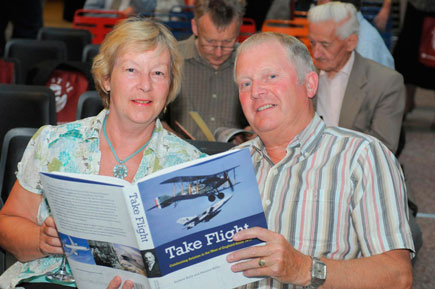
Dave Harris - Extract 1 01:42 minutes (1.66MB) (MP3)
Dave recalls the different sections he worked in as an apprentice and suffering from arc eye.
Dave Harris - Extract 2 02:14 minutes (2.14MB) (MP3)
Dave explains how the Britannia fuselage was riveted.
Dave Harris - Extract 3 01:50 minutes (1.78MB) (MP3)
Dave recalls complaints about the noise during engine tests.
Dave Harris - Extract 4 02:24 minutes (2.30MB) (MP3)
Dave explains his role as a Welfare Rep.
Dave Harris - Audio transcription and notes (Word file) |
Patrick Kelly (recorded 31 October 2008)
Patrick joined Bristol Aeroplane Company as an office boy at the age of 14 during World War Two, working at the dispersal site based at Bristol Zoo. He began his apprenticeship at 16 in the machine shop. He was transferred from Patchway to the Corsham underground factory to work in the Development Department. He finished his apprenticeship in 1953. He left the company in 1958, moving to Aldermaston, because of the local housing shortage. He returned in 1962 to work in the tool shop and remained there until he retired.
Patrick Kelly - Extract 1 02:13 minutes (2.12MB) (MP3)
Patrick recalls starting at Bristol Aeroplane Company during the war and then becoming an apprentice.
Patrick Kelly - Extract 2 02:11 minutes (2.10MB) (MP3)
Patrick recalls his work colleagues and how he applied to Bristol Aeroplane Company.
Patrick Kelly - Audio transcription and notes (Word file) |
Harold Dursley (recorded 26 March 2009)
Harold joined Bristol Aeroplane Company as a wartime apprentice. His elder sister also worked at the factory. He was originally based at the dispersal site of Doddington near Chipping Sodbury and transferred to Filton when the site was closed. He worked as a fitter in the light engineering division. He returned to the company after National Service in 1948 and was involved in various projects before moving to helicopters. He was made an inspector in the erecting shop. He applied for a job at Weston-super-Mare where he stayed for six years. He returned to Filton as flight inspector and became planning engineer for Concorde. When that project ran down he was made section leader for Miscellaneous Planning. He joined management in 1983 and took early retirement at the age of 59. The group photo comes from 1955 when Harold was working in the erecting hall: he is third from the right in the back row. The colour photograph is of Harold and his wife celebrating her 80th birthday in the Canary Islands in 2010.
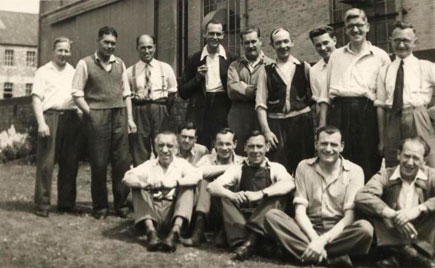
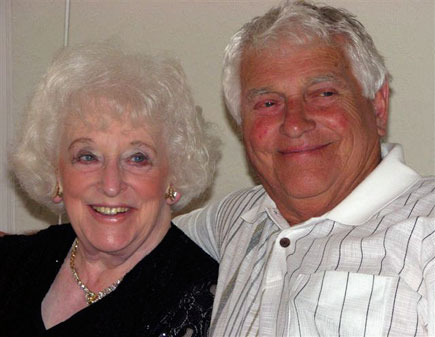
Harold Dursley - Extract 1 02.46 minutes (2.62 MB) (MP3)
Harold describes his wartime apprenticeship.
Harold Dursley - Extract 2 01.49 minutes (1.76MB) (MP3)
Harold recalls transferring to Weston-super-Mare.
Harold Dursley - Extract 3 02.46 minutes (2.64MB) (MP3)
Harold describes the Concorde mock-up.
Harold Dursley - Extract 4 01.51 minutes (1.79MB) (MP3)
Harold recalls servicing the Sultan of Oman's VC10 at Filton.
Harold Dursley - Audio transcription and notes (Word file) |
Michael Lait (record 30 April 2009)
Michael began his Bristol Aeroplane Company apprenticeship in the autumn of 1956 after finishing his A levels. In was awarded his HND in 1960 and started work in the design office as a junior hydraulics systems engineer. In 1982, with the Concorde programme starting to run down, he volunteered to become a production troubleshooter, mainly being based in the bonding shop. He took early retirement in 1993. The black and white photograph shows Michael with his class at Bristol Technical College which was taken in 1960, the year they completed their apprenticeship in 1960: he is third from the left in the front row. The colour photograph shows the class reunited in 1990.
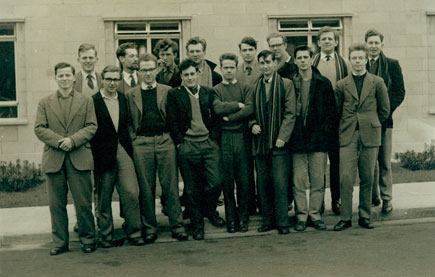
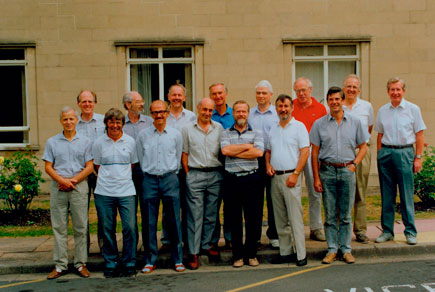
Michael Lait - Extract 1 04.22 minutes (4.10MB) (MP3)
Michael describes his apprenticeship in the 1950s.
Michael Lait - Extract 2 02.52 minutes (2.72MB) (MP3)
Michael recalls working on Concorde.
Michael Lait - Extract 3 02.26 minutes (2.33MB) (MP3)
Michael describes some of the different working environments at the factory.
Michael Lait - Extract 4 02.12 minutes (2.11MB) (MP3)
Michael recalls working on the missile programme while he was an apprentice.
Michael Lait - Extract 5 03.17 minutes (3.11MB) (MP3)
Michael describes the hierarchy at the factory.
Michael Lait - Audio transcription and notes (Word file) |
Morris Preston (recorded 22 January 2009)
Morris started working for Bristol Aeroplane Company in 1939 as an apprentice in the tool room at Patchway. He left to do his National Service in 1946, going back to the tool room on his return. He became a technical author in 1958. He was made redundant in the late 1960s. His father and his son also worked in the tool room. The photo is of Morris in the tool room. It was used in a display put up during Brabazon's Open Day.
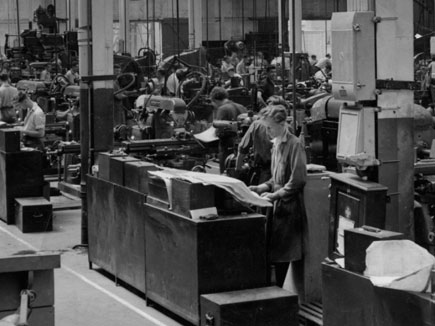
Morris Preston - Extract 1 01.53 minutes (1.83MB) (MP3)
Morris recalls his apprenticeship in the tool room at Patchway.
Morris Preston - Extract 2 01.43 minutes (1.68MB) (MP3)
Morris describes the thousands of employees streaming to and from work.
Morris Preston - Extract 3 0.46 minutes (821KB) (MP3)
Morris explains the changes that came with the start of jet engine production.
Morris Preston - Extract 4 01.54 minutes (1.83MB) (MP3)
Morris recalls the toilet facilities at the factory and smoking in the tool room.
Morris Preston - Audio transcription and notes (Word file) |
Fred Smith
(recorded 29 January 2009 and
5 March 2009)
Fred's father was called up in 1943 and went to work in Bristol Aeroplane Company's underground factory near Corsham, his family moving into the new estate that was built there for munitions workers. Fred left school at 14 and joined the factory himself as an office boy. He worked there for nine months. When the workshops returned to the main factory site at Patchway, workers were bussed out from the Corsham estate each day. Fred found the hours too long for him so he left to get an engineering apprenticeship. He did his National Service in the Royal Air Force and when he came out applied to the drawing office at Filton. He worked on full-scale layout for making metal templates. At the end of the Britannia project he moved into the stress office and for rest of his career was involved in aspects of weights and measures for various projects including the Type 188, Type 198, Concorde, Airbus A320 and space programme. He took early retirement in his 50s.
Fred Smith - Extract 1 02.13 minutes (2.13MB) (MP3)
Fred explains why he took early retirement and recalls what he had liked about his job.
Fred Smith - Extract 2 01.17 minutes (1.27MB) (MP3)
Fred recalls playing as a boy in and around the munitions factory estate.
Fred Smith - Extract 3 01.34 minutes (1.53MB) (MP3)
Fred recalls some of the social activities at the factory.
Fred Smith - Audio transcription and notes (Word file) |
Derek Wilding (recorded 13 November 2008)
Derek joined Rolls-Royce at Patchway in September 1966, the third generation of his family to work in the local aviation industry. He was sent to university by the company to enhance his knowledge of computerisation, returning in 1968. He was transferred to Coventry in 1971 and returned once more to Patchway in 1974 for the Concorde project. He retired in June 2004.
Derek Wilding - Extract 1 01.34 minutes (1.54MB) (MP3)
Derek shares some of the things he has learnt about his grandfather's time at the factory.
Derek Wilding - Extract 2 02.42 minutes (2.57MB) (MP3)
Derek recalls his father and another Wilding relation working at the factory.
Derek Wilding - Extract 3 03.02 minutes (2.88MB) (MP3)
Derek describes the impact of computerisation on the work place.
Derek Wilding - Audio transcription and notes (Word file) |
Bill Wolstenholme (recorded 4 November 2008)
Bill joined the British Aeroplane Company as an apprentice in 1961 and was among the first residents at Barnwell Hall. His work for the company included making the engine doors for Concorde before he moved into guided weapons.
Bill Wolstenholme - Extract 1 02.32 minutes (2.41MB) (MP3)
Bill recalls a typical day as an apprentice in the 1960s.
Bill Wolstenholme - Extract 2 01.48 minutes (1.74MB) (MP3)
Bill recalls some of the social activities at work including the trips of the Foremen's Association.
Bill Wolstenholme - Extract 3 01.43 minutes (1.67MB) (MP3)
Bill recalls how the unions helped to bring an end to some of the employment anomalies at the factory.
Bill Wolstenholme - Audio transcription and notes (Word file) |
Ken Bracey (recorded 7 March 2009)
 |
Ken started in the BAC erecting hall in 1937 aged 15 years as an aircraft fitter working on the Blenheim Mk I and Mk IV. He then moved on to Beaufort aircraft and Beaufighters with a six month spell away in 1940 on other essential war work. From 1942 to 1947 he was an engine fitter in the Royal Air Force. He returned to BAC Transport Department in February 1949 to tow the Brabazon and became part of the aircraft's ground crew. He then moved on to Britannia's towing and ground crew. He joined the Planning Department in 1956 and then transferred to the Engine Division's drawing office as a draughtsman. He retired in 1982.
Ken has a strong family association with BAC and its associated companies. His mother Eleanor Marsh (below left) worked in the Varnishing Shop from 1917 to 1919, doping the wings of the Bristol Fighter. His grandfather Alfred Marsh (below centre) joined British & Colonial in 1911 at the age of 37. He retired in 1938 but returned for another five years service during World War Two. In the 1920s Ken's uncle Albert Marsh (below right) joined the Carpenters Shop at BAC straight from school. He transferred to Rotol near Gloucester where he made hand-built propellers. During the war he moved to the new Rotol factory at Preston. He then returned to Filton to work in the BAC Planning Office. He retired at 65. Ken's father joined the Transport Department during World War Two and was still working there when Ken rejoined the company in 1949.
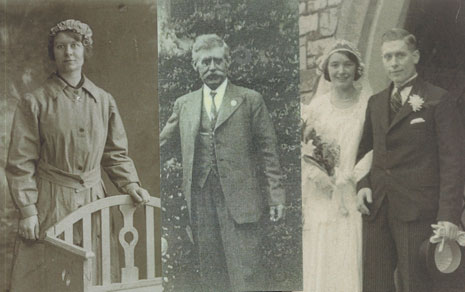
More photos of his family.
Ken Bracey - Extract 1 04.50 minutes (2.27MB) (MP3)
Ken explains his family's different roles at the company.
Ken Bracey - Extract 2 04:21 minutes (1.99MB) (MP3)
Ken recalls coming back to BAC to drive the large tractor used to tow the Brabazon.
Ken Bracey - Extract 3 04:32 minutes (2.13MB) (MP3)
Ken tells of an encounter between his grandfather and Sir Stanley White.
Ken Bracey - Extract 4 01:56 minutes (910KB) (MP3)
Ken recalls fuel tests on Brabazon.
Ken Bracey - Extract 5 01:25 minutes (672KB) (MP3)
Ken recalls Brabazon being broken up for scrap.
Ken Bracey - Extract 6 01.19 minutes (625KB) (MP3)
Ken recalls a flight on Brabazon at Farnborough.
Ken Bracey - Extract 7 06:00 minutes (2.75MB) (MP3)
Ken describes events around the forced landing of a Britannia full of VIPS on the mud at Littleton on Severn.
Ken Bracey - Audio transcription and notes (Word file) |
Peggy Allen (recorded 9 January 2009)
Peggy grew up in the bakery opposite the main gate of Bristol Aeroplane Company. She went to Filton College for secretarial training, and worked at BAC in the holidays as a copy typist in No 7 Drawing Office. After initially taking a job in the centre of Bristol, she moved to the Guided Weapons Division at BAC in December 1963 where she was the personal secretary to the Exhibitions Officer. She left in May 1966 to start a family. Between 1974 and 1976 she worked for the Pamela Neave employment agency as a typist. During that time she did a couple of weeks in the Finance Department in Filton House and then a six-month stint in the typing pool of the Aircraft Division where she typed Concorde flight manuals. Other members of her family also worked for the company.
Peggy Allen - Extract 1 02:13 mins (1.08MB) (MP3)
Peggy recalls activity at her family's bakery and the other Filton shops opposite the BAC gates.
Peggy Allen - Extract 2 01:40 mins (782KB) (MP3)
Peggy recalls local pride in Concorde and her family's connection to the project.
Peggy Allen - Audio transcription and notes (Word file)
|
Oliver Dearden (recorded 13 November 2008)
Oliver was appointed as a Technical Engineer in the Structures Department of the Bristol Aeroplane Company and started work on 16 August 1954. He left the company which by then had become Bristol Aircraft Ltd in September 1958. He is now Chairman of Bristol Aero Collection and Trustee of the Concorde Trust. His wife Mary was a tracer at BAC.
Oliver Dearden - Extract 1 02:15 mins (1.06MB) (MP3)
Oliver talks about the specifications from BOAC for the Britannia airliner.
Oliver Dearden - Extract 2 03:08 mins (1.47MB) (MP3)
Oliver recalls walking around the factory site.
Oliver Dearden - Audio transcription and notes (Word file) |
Patrick Hassell (recorded 12 December 2008)
Patrick joined the Aerodynamics Department of what was then British Aircraft Corporation Limited Filton Division in April 1970 as an engineer. After nationalisation in 1978, the company became British Aerospace Aircraft Group Filton-Weybridge Division. Patrick left in March 1979 to work for Douglas in Long Beach, California.
Patrick Hassell - Extract 1 07:22 mins (3.46MB) (MP3)
Patrick recalls working with the French engineers on the Concorde project and reflects why the aircraft was not an economic success.
Patrick Hassell - Extract 2 06:57 mins (3.26MB) (MP3)
Continuing his reminiscences, Patrick recalls his first opportunity to fly in Concorde during the original overseas performance trials on prototype 002 at Jan Smuts airport, Johannesburg in February 1973. He also recalls the special takeoff procedures which minimised its noise impact.
Patrick Hassell - Extract 3 01:44 mins (818KB) (MP3)
Patrick talks about the cancellation of the PanAm order and its implications.
Patrick Hassell - Extract 4 04:03 mins (1.9MB) (MP3)
Patrick talks about the office environment and working conditions.
Patrick Hassell - Extract 5 06:24 mins (3MB) (MP3)
Patrick recalls the development in the use of calculators and computers on the project, and his involvement in the high temperature tests at Bahrain.
Patrick Hassell - Audio transcription and notes (Word file) |
Michael Clinch (recorded 28 November 2008)
Michael's father was Bristol Aeroplane Company's sales service representative for the whole of South America. He joined the company himself as an apprentice in 1948. His apprenticeship lasted six years and he gained experience in the different workshops on the engine side of the company during that period. He later moved to Coventry as part of Bristol Siddeley.
Michael Clinch - Extract 1 01:48 mins (849KB) (MP3)
Michael recalls the training provided at BAC and some of the tricks played by apprentices.
Michael Clinch - Extract 2 01:52 mins (878KB) (MP3)
Michael recalls some of the different shops and the women working on the thread rolling machines.
Michael Clinch - Extract 3 01:47 mins (839KB) (MP3)
Michael explains the system of rate fixing.
Michael Clinch - Extract 4 04:09 mins (1.95MB) (MP3)
Michael explains the work of the polishing shop, recalls travelling by bus with the men and their 'Bristol haircuts', and tells about the apprentice project in the washroom.
Michael Clinch - Extract 5 01:08 mins (535KB) (MP3)
Michael recalls the sources of information in the company.
Michael Clinch - Extract 6 02:37 mins (1.23MB) (MP3)
Michael recalls activities in the plating shop and testing sleeve-valve engines.
Michael Clinch - Extract 7 03:06 mins (1.46MB) (MP3)
Michael talks about improvements to tooling over the years and about engine crankshafts.
Michael Clinch - Audio transcription and notes (Word file) |
David Baker (recorded 31 October 2008)
David joined Bristol Aeroplane Plastics as a skilled re-enforced plastic fitter in 1968. His father still worked at Dynamics at the time. In 1973 he moved to staff as a Production Engineer. In 1975 he became Section Leader Production Services. In 1978 he joined British Aerospace Dynamics as a Project Planner on a classified Naval Weapons project. He moved to the Vertical Launch SeaWolf as Database Controller in 1982. In 1984 he moved to the Naval Weapons project office as Database Controller. He became Team Leader-Business Systems Development in Information Technology in 1986. He was made redundant in 1990 (along with the entire IT department) and became self employed before joining Orange prior to retirement.
David Baker - Extract 1 02:17 mins (1.07MB) (MP3)
David explains how the bonus system worked, the role of inspectors and talks about waiting time.
David Baker - Extract 2 02:27 mins (1.23MB) (MP3)
David recalls his experience of the apprenticeship system and the training that was available.
David Baker - Extract 3 02:46 mins (1.43MB) (MP3)
David talks about the activities of the Welfare Association including the prize draws.
David Baker - Extract 4 01:11 mins (562KB) (MP3)
David recalls working on the nightshift.
David Baker - Extract 5 06:04 mins (2.9MB) (MP3)
David talks about the impact of redundancy and some of the incidents of pilfering that occurred around the factory.
David Baker - Extract 6 01:25 min (768KB) (MP3)
David recounts falling asleep at work on the nightshift.
David Baker - Audio transcription and notes (Word file) |
Lewis Gray (recorded 28 May 2009)
Lew started at Bristol Aeroplane Company as a fitter in January 1953. He was elected Shop Steward for the Amalgamated Engineering Union the following year and was elected Leading Steward in 1968. He left the company in 1975 when he was elected the union's District Secretary. He was elected Divisional Organiser in 1978 and retired in August 1992.
Lewis Gray - Extract 1 02:04 minutes (977KB) (MP3)
Lew recalls the union recruitment drive in the BAC assembly hall in 1957 that was prompted by a forthcoming national strike.
Lewis Gray - Extract 2 03:19 minutes (1.56MB) (MP3)
Lew explains the procedure for pay and bonus negotiations.
Lewis Gray - Extract 3 08:30 minutes (4MB) (MP3)
Lew recalls some of the guerrilla tactics used during negotiations and the rally in support of Concorde which united workers, staff and management.
Lewis Gray - Audio transcription and notes (Word file) |
Ray Horne (recorded 9 October 2008)
 |
Ray joined Bristol Aeroplane Company as a Tool Room apprentice, qualifying as a Toolmaker in 1958. He then did his National Service and returned to the company in 1960 as a Junior Designer in the Tool Design Office. By the time he finished there in 1970 he was a Senior Tool Designer. From 1970 to 1992 he was a Senior Development Engineer in the Research and Development Department. He retired early on 28 August 1992.
Ray Horne - Extract 1 04:14 minutes (1.98MB) (MP3)
Ray recalls some of the social activities at BAC and the support of the Welfare Association.
Ray Horne - Extract 2 01:29 minutes (700KB) (MP3)
Ray recalls the working hours as an apprentice and the medical checks.
Ray Horne - Extract 3 01:29 minutes (700KB) (MP3)
Ray remembers gaining weight and height, in part thanks to helpings of the so-called Navvies wedding cake.
Ray Horne - Extract 4 01:10 minutes (511KB) (MP3)
Ray recalls some of the apprentices' tricks and the dangers of going into the machine shop at Christmas time.
Ray Horne - Extract 5 01:33 minutes (735KB) (MP3)
Ray recounts what he learnt about the bombing raids at Filton and the company air raid shelters.
Ray Horne - Extract 6 01:16 minutes (601KB) (MP3)
Ray explains how progressing through the ranks has changed.
Ray Horne - Audio transcription and notes (Word file) |
Bernice Harris (recorded 19 March 2009)
Bernice spent most of her childhood in Patchway. She started at the company's secretarial training school in September 1961. Her first job was in the Typing Pool. She then moved to a small office in the West Bay of the hangar working for the Manufacturing Development Department. Her parents met when they both worked at BAC during the war.
Bernice Harris - Extract 1 01:59 minutes (933KB) (MP3)
Bernice recalls joining BAC and being one of the few females in the hangar.
Bernice Harris - Extract 2 03:00 minutes (1.4MB) (MP3)
Bernice remembers the social activities with her colleagues, and meeting and marrying her husband, Dave.
Bernice Harris - Extract 3 01:08 minutes (539KB) (MP3)
Bernice recalls the visit of King Hussein of Jordan and watching the first Concorde flight.
Bernice Harris - Audio transcription and notes (Word file) |
|
|
|
|


